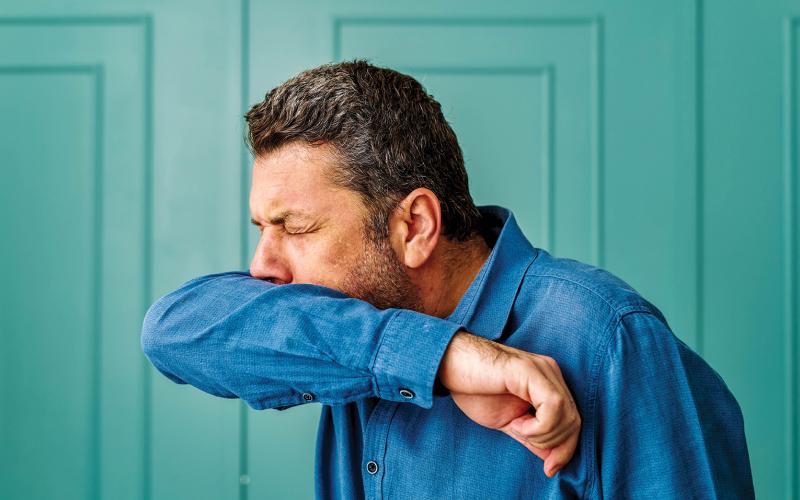Editor's note: Southeast Georgia Health System has shared the following information from infectious disease specialist Dr. Steven Mosher. The health system has also set up a free COVID-19 screening hotline at (912) 466-7222.
Even during a pandemic, every little sneeze or cough should not cause panic. It is the height of pollen season, after all, and the Golden Isles are more golden than usual!
To help you make sense of sniffles and sneezes, Steven F. Mosher, M.D., a board-certified internal medicine physician specializing in infectious disease and member of the Southeast Georgia Health System medical staff, discusses the differences between the novel coronavirus (COVID-19) and seasonal illnesses.
Coronavirus vs. common illnesses
Some symptoms associated with COVID-19 do overlap with cold, flu and nasal allergy symptoms. There is one big difference, however. Coronavirus infects the lower respiratory tract; colds and allergies affect the upper respiratory tract.
“Coronavirus affects the lungs and chest more than other seasonal ailments. The most common symptoms are fever and a dry cough. Seek immediate medical care if you experience shortness of breath, rapid breathing, chest pain or pressure and confusion,” says Mosher. “But call before going to your doctor’s office, urgent care, or emergency care center. They’ll ask certain questions to determine if you need testing and will give you directions on how to avoid exposing others when you arrive.”
While people with asthma may experience shortness of breath during allergy season, Mosher explains, “If your nose is affected, it’s probably a cold or hay fever.”
For many people, the flu may be more miserable than coronavirus. “Most flu sufferers experience exhaustion, sore throat, fever, heavy coughing, aches and pains and headache,” says Mosher. “Depending on the flu strain, you might get a stuffy nose and sneezing, too. However, unlike COVID-19, there is rarely shortness of breath.”
To test or not to test
“Not everyone needs a test, even if they have symptoms,” explains Mosher. “Southeast Georgia Health System follows the Centers for Disease Control and Prevention and the Georgia Department of Public Health recommendations. Unless you meet certain criteria, you don’t need to be tested for coronavirus. If you don’t meet the criteria, you can lower your exposure to illness by staying home.”
Some of the questions you may be asked include:
1. Do you have a cough, fever or shortness of breath?
2. Have you been exposed to someone diagnosed with coronavirus within the last 2 to 14 days?
3. Have you have traveled recently?
4. Do you have any underlying medical conditions?
The healthsystem is currently providing reference testing of patients with suspected COVID-19 illness for inpatients and emergency care center patients at both hospital locations and through Glynn Immediate Care Center and an extension of Southeast Georgia Physician Associates Camden Primary Care for outpatients.
The test is quick and simple. A health care provider inserts a cotton swab (similar to a long Q-tip) into one nostril to collect a sample. It is somewhat uncomfortable, but not painful. The sample is sealed in a sterile container and sent to a commercial testing laboratory or the Department of Public Health. DPH tests are reserved for severely ill or hospitalized patients. Commercial laboratories return results in about 7-10 days, although some results may take longer due to the increasing number of outpatients for whom testing has been requested; DPH returns results in two to three days.
Health System inpatients will be notified of their test results by their physician. If tested through the ECC, positive results are reported to the patients by the DPH and negative results will be communicated to the patient by the ECC team. Patients tested at a physician practice or Immediate Care Center affiliated with the Health System get a call from the practice. “Depending on your age, underlying medical conditions and severity of symptoms, you may be advised to self-quarantine and recover at home or told to go to the hospital,” says Dr. Mosher.
As of March 25, the Health System has tested 252 patients, received results for 91 patients and is waiting on results from 161 tests. Thus far, three patients tested positive.
“We are still learning about this virus, but people should know that most positive COVID-19 patients will suffer mild symptoms that can be treated at home,” says Mosher. “Those with mild symptoms should stay home and isolate from other family members for seven days since the symptoms first appeared or until they are symptom free for 72 hours, whichever is longer.”
Mosher adds, “Help yourself and your local health care workers by practicing good hand hygiene and limiting social contact for the time being.”
For coronavirus information, visit www.sghs.org or call Georgia’s public telephone hotline, 844-442-2681.

